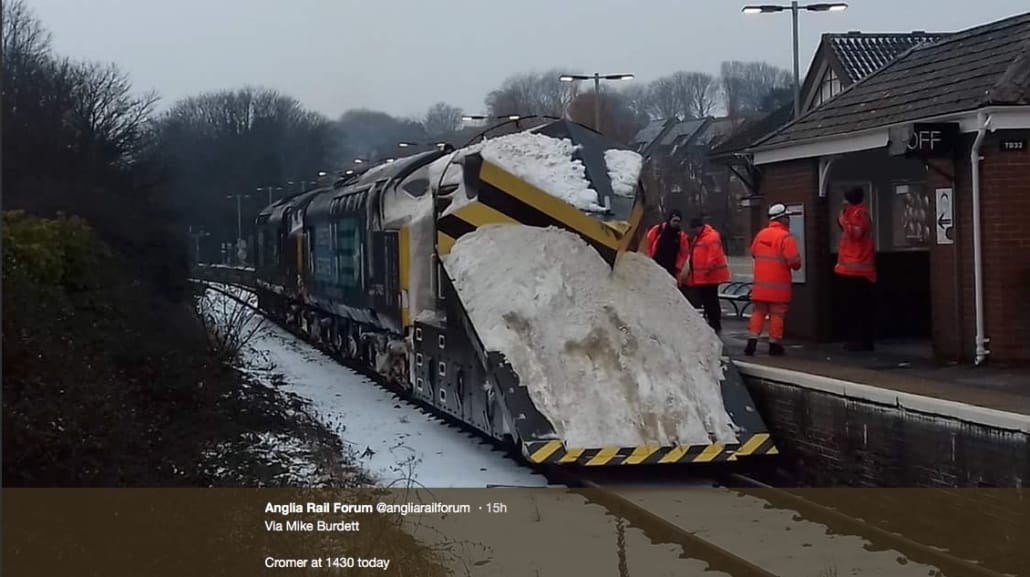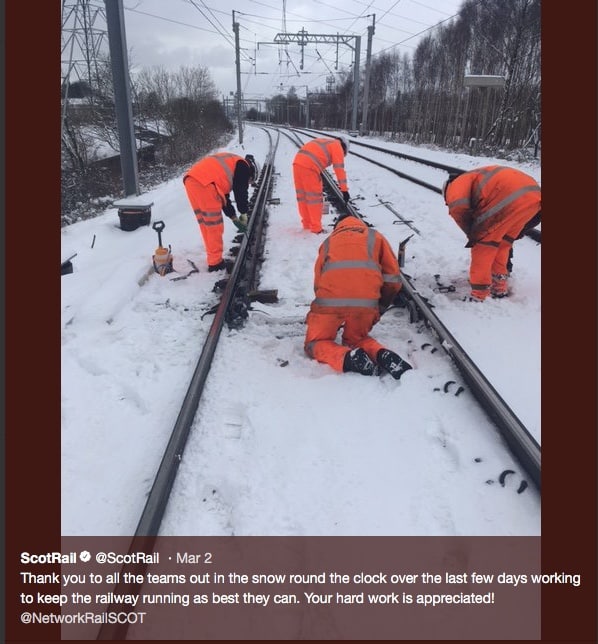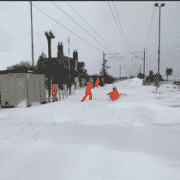Beast from the East – Wrestling with the Comms
The Beast from the East gave Britain a whole host of challenges and while armies of people were dealing with the practical problems others were wrestling with the communications challenge. The train companies spokespeople didn’t quite reach the nadir of the ‘wrong type of snow’ excuses we saw a few years ago. However, many travellers across the UK have expressed frustration with the lack of information and credible explanations on why things have ground to a halt so dramatically.

The Beast from the East made driving trains difficult and sometimes impossible. It also posed communication challenges.
I preface everything below with the acknowledgement that hindsight is a wonderful thing and gives you 20/20 vision. Nor am I making light of weather which has resulted in several fatalities:
But here are a few observations:
Beast from the East reporting initially guilty of hyperbole
A key part of crisis preparation follows the maxim that ‘forewarned is forearmed’ and so it was reasonable for the media to start warning people that severe weather was on the way several days before it hit. However, another key part of crisis preparation is getting the tone right. So, I began to get slightly irritated at the very start of the week when I heard weather presenters and reporters talking in terms of Armageddon, with temperatures as “shockingly cold as -5C” and “snowfall likely to reach as much as 5 – 10cms”. This is what us northerners call ‘winter’. Neither rare or shocking.
Predicting the weather and its timing is not an exact science. But with the reporting reaching fever pitch right from the start, and the weather initially only hitting the south-east hard, I noticed in Cumbria considerable ‘weather warning fatigue’. That was just before the worst was about to come and all the red weather warnings were being issued for other parts of the country. The hyperbole early in the week might explain why later people took the decision to travel, despite being told not to. Sometimes with very serious results. A reminder that timing and perspective are vital for effective communication in a crisis.

Train operators: no credible key messages
During severe weather in 1991, a hapless British Rail spokesman infamously tried to explain in an interview that mass train cancellations were caused by the type of snow. The media instantly pounced on his comments and he was held up to ridicule. ‘The wrong type of snow’ even has its own Wikipedia page, helpfully explaining that “in the United Kingdom, the phrase became a byword for euphemistic and pointless excuses”.
So, I can understand why those caught up in a crisis are often reluctant to stick their head above the parapet and face the media. But, on the other hand, most types of crises can be foreseen, even if the exact timing of them cannot. So, while we don’t get bad winters as often as we used to, they are still fairly regular events, and I have found it surprising that, in the coverage I have heard this week, train operators in particular didn’t have more credible and understandable messages prepared to explain the delays and cancellations travellers were facing.
Clear messages are only part of what is needed to face journalists in a crisis. They will only be credible if you have sufficient examples to make them real and understandable. It’s always an indication that your messages are not fully developed if a journalist starts asking for examples to explain what you mean, as happens towards the end of the interview. Another clue: the journalist starts arguing with the examples given, as happens here with the journalist saying “if traffic lights continue to work on roads why can’t signals on railways?”
Social media: a picture is worth a thousand words
While word pictures are vital to back up your arguments, use of social media in a crisis can really help you get your point across. One good example is the pictures and video Direct Rail Services posted on their Twitter feed which show far more effectively than words ever could what they were having to deal with during “The Beast From the East”.

Images from Twitter
- Preparing for media interviews: don’t overlook the obvious question - February 4, 2020
- Interview soundbites: prepare in advance or journalists will feed you theirs! - October 11, 2019
- Why critics of media training miss the point - August 6, 2018





Leave a Reply
Want to join the discussion?Feel free to contribute!